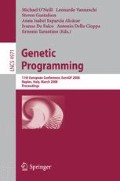Abstract
Evolutionary algorithms are effective at creating cooperative, multi-agent systems. However, current Island and Team algorithms show subtle but significant weaknesses when it comes to balancing member performance with member cooperation, leading to sub-optimal overall team performance. In this paper we apply a new class of cooperative multi-agent evolutionary algorithms called Orthogonal Evolution of Teams (OET) which produce higher levels of cooperation and specialization than current team algorithms. We also show that sophisticated behavior evolves much sooner using OET algorithms, even when training resources are significantly reduced. Finally, we show that when teams must be reformed, due to agent break down for example, those teams composed of individuals sampled from OET teams perform much better than teams composed of individuals sampled from teams created by other methods.
Access this chapter
Tax calculation will be finalised at checkout
Purchases are for personal use only
Preview
Unable to display preview. Download preview PDF.
References
Cantu-Paz, E., Kamath, C.: Inducing oblique decision trees with evolutionary algorithms. IEEE Transactions on Evolutionary Computation 7(1), 54–68 (2003)
Haynes, T., Sen, S.: Evolving behavioral strategies in predators and prey. In: Weiß, G., Sen, S. (eds.) Adaptation and Learning in Multiagent Systems. LNAI, Berlin, Germany, Springer, Heidelberg (1995)
Haynes, T., Sen, S., Schoenefeld, D., Wainwright, R.: Evolving a team. In: Siegel, E.V., Koza, J.R. (eds.) Working Notes for the AAAI Symposium on Genetic Programming. AAAI, 10–12 November, pp. 23–30. MIT, Cambridge (1995)
Iba, H.: Multiple-agent learning for a robot navigation task by genetic programming. In: Koza, J.R., Deb, K., Dorigo, M., Fogel, D.B., Garzon, M., Iba, H., Riolo, R.R. (eds.) Genetic Programming 1997: Proceedings of the Second Annual Conference, pp. 195–200. Morgan Kaufmann, San Francisco (1997)
Komireddy, P., Soule, T. (eds.): Orthogonal Evolution of Teams: A Class of Algorithms for Evolving Teams with Inversely Correlated Errors (2006)
Luke, S., Panait, L.: Cooperative multi-agent learning: The state of the art. Autonomous Agents and Multi-agent Systems 11(3), 387–434 (2005)
Liu, Y., Yao, X., Higuchi, T.: Evolutionary ensembles with negative correlation learning. IEEE Transactions on Evolutionary Computation 4(4), 380–387 (2000)
Luke, S., Hohn, C., Farris, J., Jackson, G., Hendler, J.: Co-evolving soccer softbot team coordination with genetic programming. In: Proceedings of the First International Workshop on RoboCup, at the International Joint Conference on Artificial Intelligence, Nagoya, Japan (1997)
Luke, S., Spector, L.: Evolving teamwork and coordination with genetic programming. In: Koza, J.R., Goldberg, D.E., Fogel, D.B., Riolo, R.L. (eds.) Genetic Programming 1996: Proceedings of the First Annual Conference, Stanford University, CA, USA, 28–31 July, pp. 150–156. MIT Press, Cambridge (1996)
Obitz, D.W., Basak, S.C., Gute, B.D.: Hazard assessment modeling: An evolutionary ensemble approach. In: Proceedings of the Genetic and Evolutionary Computation Conference: GECCO-1999, pp. 1543–1650. Morgan Kaufmann, San Francisco (1999)
Platel, M.D., Chami, M., Clergue, M., Collard, P.: Teams of genetic predictors for inverse problem solving. In: Keijzer, M., Tettamanzi, A.G.B., Collet, P., van Hemert, J.I., Tomassini, M. (eds.) EuroGP 2005. LNCS, vol. 3447, Springer, Heidelberg (2005)
Raik, S., Durnota, B.: The evolution of sporting strategies. In: Stonier, R.J., Yu, X.H. (eds.) Complex Systems: Mechanisms of Adaption, pp. 85–92. IOS Press, Amsterdam (1994)
Soule, T., Heckendorn, R.B.: Evolutionary optimization of cooperative heterogeneous teams. In: SPIE Defense and Security Symposium (2007)
Soule, T., Heckendorn, R.B.: Improving performance and cooperation in multi-agent systems. In: Proceedings of the Genetic Programming Theory and Practice Workshop (2007)
Thomason, R., Soule, T.: Novel ways of improving cooperation and performance in ensemble classifiers. In: Proceedings of the Genetic and Evolutionary Computation Conference: GECCO-2007, pp. 1708–1715. Morgan Kaufmann, San Francisco (2007)
Author information
Authors and Affiliations
Editor information
Rights and permissions
Copyright information
© 2008 Springer-Verlag Berlin Heidelberg
About this paper
Cite this paper
Thomason, R., Heckendorn, R.B., Soule, T. (2008). Training Time and Team Composition Robustness in Evolved Multi-agent Systems. In: O’Neill, M., et al. Genetic Programming. EuroGP 2008. Lecture Notes in Computer Science, vol 4971. Springer, Berlin, Heidelberg. https://doi.org/10.1007/978-3-540-78671-9_1
Download citation
DOI: https://doi.org/10.1007/978-3-540-78671-9_1
Publisher Name: Springer, Berlin, Heidelberg
Print ISBN: 978-3-540-78670-2
Online ISBN: 978-3-540-78671-9
eBook Packages: Computer ScienceComputer Science (R0)

